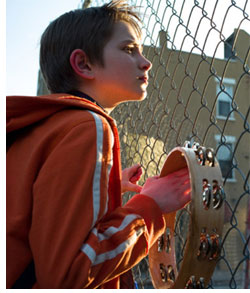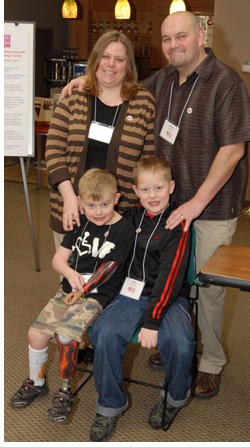by Bob Glowacki
When I read a story about apps and autism on the BBC News website I thought it would make a great discussion on our autism blog. At Easter Seals Southeast Wisconsin we have grown our autism services and added a few iPads to begin tapping this technology. I asked our staff what they are seeing and recommending with the children we serve. Today’s guest post is written by senior therapist Melissa Born. In my next post I’ll introduce another senior therapist at Easter Seals Southeast Wisconsin who explains how her own two sons, both who have autism, use iPad apps to help them communicate.
App gives individuals with autism a voice
by Melissa Born
A very popular augmentative communication app called Proloquo2Go is being purchased by assistive technology specialists, occupational therapists, speech language pathologists, behaviorists, special education teachers, and other professionals and parents to help meet the communicative needs of children and adults who are unable to communicate verbally.
AssistiveWare first released Proloquo2Go in April of 2009, and it can be purchased on iTunes and is fully compatible for easy use with the iPad, iPod Touch, and iPhone. This remarkable App helps children and adults who are unable to speak to express themselves through text-to-speech voice, and can be modified and individualized in many different ways to meet the dynamic needs of different users.
Proloquo2Go comes with a very large default vocabulary, almost 8,000 up-to-date symbols, and the capability to immediately import photos on the spot and incorporate them into the user’s word/picture library. The app can be modified in numerous ways, such as voice (age, gender, volume, pitch, rate, dialect, etc.), symbol size, and number of symbols appearing on the screen at once.
Proloquo2Go allows its users various options to communicate through the iPad’s touch screen. A user may select symbols, words, symbols paired with words, or even letters on a QWERTY keyboard.
When Proloquo2Go is purchased and loaded onto an iPad, it comes with a large library, organized into different categories. However, at any point, the application can easily be programmed and tailored to meet the needs of each individual user. You can change initial settings by deleting, adding, cutting, and pasting words/pictures.
An individual can use a symbol from the default symbol library, take a picture with the iPad/iPod Touch/iPhone to use, or even find a picture on the internet (such as a place in the community that the individual might go) to use in Proloquo2Go.
Previously, a person unable to communicate verbally may have carried around a relatively bulky and expensive dedicated device in order to meet their communication needs. But now, a simple augmentative communication app is available to purchase and load onto the convenient and lightweight iPad device … a device that can also hold many other reinforcing and/or educational apps that appeal to individuals with autism.
 I was invited to the White House today to hear the President announce that 10 states are getting waivers under the federal Elementary and Secondary Education Act. These waivers are designed to help states improve their public education systems.
I was invited to the White House today to hear the President announce that 10 states are getting waivers under the federal Elementary and Secondary Education Act. These waivers are designed to help states improve their public education systems.






 Every year as Academy Award time draws near our department here at Easter Seals Headquarters gets to talking about the low number of people with disabilities in popular films. This year I piped up. “How about the kid in ‘Extremely Loud and Incredibly Close’?” I said. “He has Asperger’s.” Turns out I was wrong about that, though.
Every year as Academy Award time draws near our department here at Easter Seals Headquarters gets to talking about the low number of people with disabilities in popular films. This year I piped up. “How about the kid in ‘Extremely Loud and Incredibly Close’?” I said. “He has Asperger’s.” Turns out I was wrong about that, though. A couple years ago my Seeing Eye dog Hanni and I traveled to Topeka to visit
A couple years ago my Seeing Eye dog Hanni and I traveled to Topeka to visit  Earlier this week I shared a
Earlier this week I shared a  Snowy weather isn’t the only winter tradition up and down the East Coast — so is Friendly’s Cones for Kids! This is
Snowy weather isn’t the only winter tradition up and down the East Coast — so is Friendly’s Cones for Kids! This is